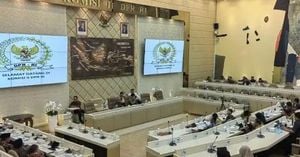Justine Bateman, best known for her role on the iconic television series Family Ties, recently expressed her strong feelings about the past four years of American politics, characterizing the period as "un-American" and asserting the erosion of common sense along the way.
During her remarks, made shortly after the Republican Party secured significant electoral victories, Bateman voiced her frustrations over what she calls "permitted behavior and speech." She described her experience over the last four years as one of discomfort and caution, likening it to "walking on eggshells." This, she claims, is indicative of the pervasive environment of fear and intolerance she perceives.
Reflecting on her thoughts, Bateman stated, "I have found the last four years to be almost intolerable. A very un-American period, where any questioning, any opinions, any likes or dislikes were held up to scrutiny by a very limited list of 'permitted positions.'" She goes on to express disbelief at the intensity of this atmosphere, noting, "It's suffocATING and one I have never encountered at such a broad level before. It’s as if intellectual discussion and common sense were dismissed at every turn."
Bateman emphasized the consequences of such intolerance, stating, "Those who dared to voice differing opinions were often met with severe backlash. Their professional and social lives were put at risk, serving as cautionary tales displayed for all on social media platforms." She poignantly remarked on this point: "The destruction was publicly exhibited—like being put on display at the Town Square—so everyone could see."
Delving deep, Bateman critiqued the transformation of societal norms and the media's role. "What we've witnessed over the past few years is the sidelining of independent thinkers, which is detrimental to any society’s progress. When innovation is threatened, and the discourse around it is stifled by punitive labeling such as 'sexist', 'racist', or 'homophobic', it creates barriers to constructive criticism. This harms not only individual expression but also societal growth at large."
While Bateman’s comments come at a tumultuous time for the nation, highlighted by President-elect Donald Trump’s sweeping victory over Vice President Kamala Harris and the Republican party regaining control of the Senate, they resonate with many who share her concerns about the state of American democracy. Her views seem to echo those of figures across the political spectrum, urging for introspection within the Democratic Party and its ideologies.
Notably, Bateman's outspokenness is reminiscent of times when celebrities and public figures voiced their opinions strongly during significant political events. Recognized not just as an actress but also as a filmmaker, she leverages her platform to challenge the status quo, whether through film, social media, or public speeches.
The discussion around America’s political climate, especially now following the shifting tides marked by electoral votes, invites broader conversations. Many worry about the divisions growing within the country. Critics, including Bateman, argue for the need to restore respect for differing opinions and values within the public discourse, cautioning against the dangers of intellectual conformity.
Such sentiments have found their way beyond the entertainment industry, reaching policymakers and community leaders. For some, Bateman's declaration resonates as a clarion call for the importance of preserving the fundamentals of American democracy, encouraging discourse, and fostering spaces for independent thought.
“When you starve a society of independent thinkers, you rob it of any forward momentum,” she maintained, asserting the importance of nurturing diverse perspectives. It’s this very culture of questioning, she argues, which allows societies to thrive.
Bateman’s discontent reflects not only personal frustrations but also the broader sentiment shared across various segments of the population who feel similarly stifled. Her remarks invite readers and citizens alike to reflect critically on the current political discourse, and perhaps challenge them to think differently about the way they engage with political narratives.
Despite her disappointment with the current state of affairs, Bateman's insistence on the need for dialogue and reflection could pave the way for new conversations about the future of American politics. The question remains—can common sense and intellectual discussions find their rightful place again, or are we to continue down this path of division and intolerance?



